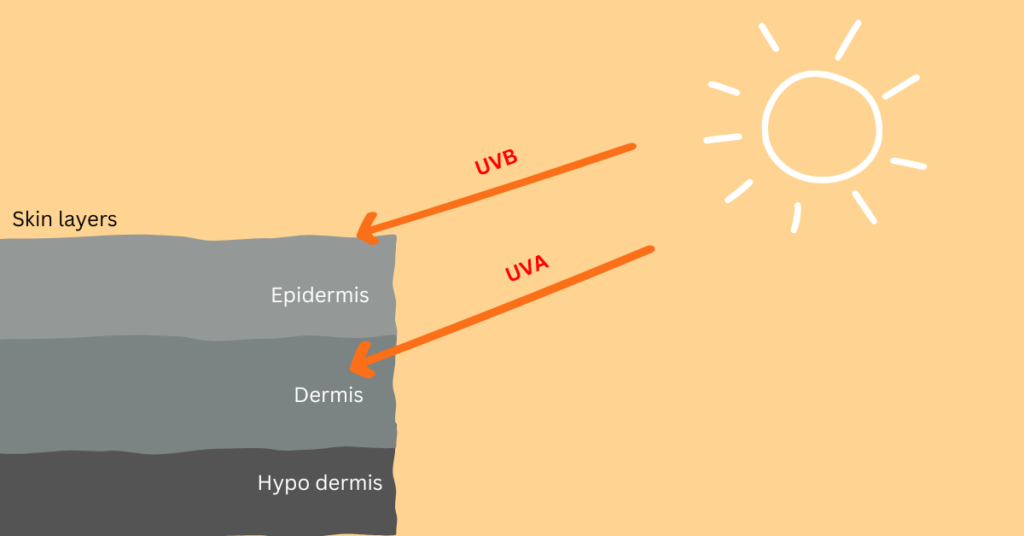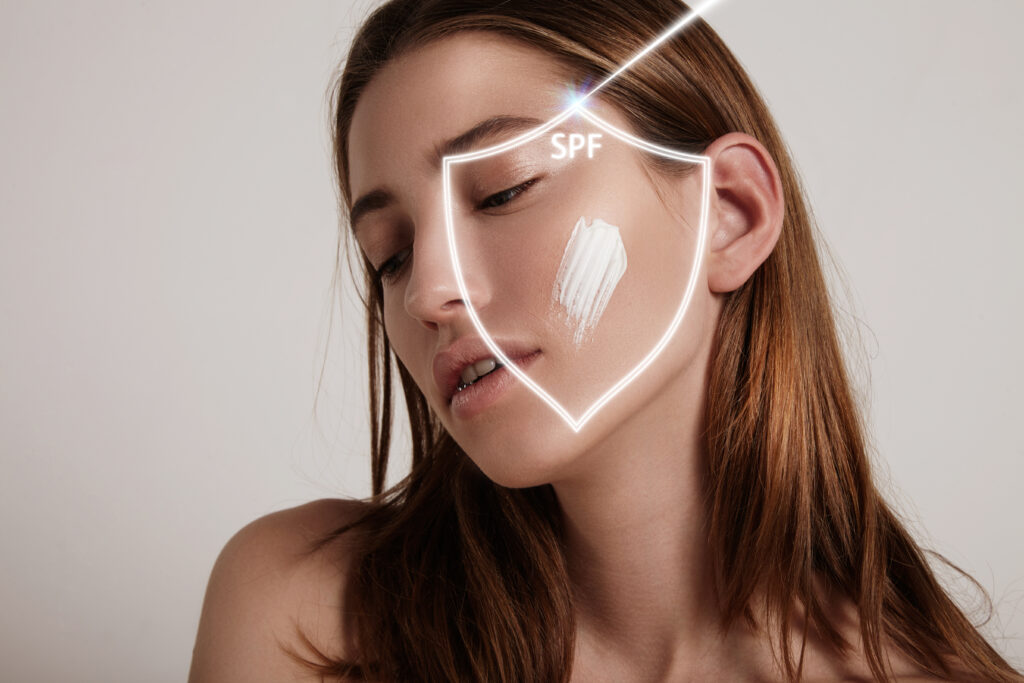Sunscreen needs no introduction in the regime of skincare. It stands as a protective barrier between harmful sunrays and your skin. It’s a non-negotiable tool for preventing sunburn and premature aging, and reducing the risk of skin cancer especially when spending time outdoors. Applying sunscreen generously and regularly can contribute significantly to maintaining healthy and protected skin in the face of the sun's potent UV rays.
Nowadays there are several information (some facts, some myths) on sunscreen available everywhere, so it’s quite clumsy most often. Let me help you decode all about the Sunscreen factors step by step like its mechanism of work, type, ingredients, application, etc.
Mechanism of Sun protection from Harsh UV Rays :
To understand the mechanism, Let's discuss briefly about UVA, UVB rays and how it penetrates skin, and how sunscreen works.
Sun emits various types of ultraviolet rays; two of the most commonly known UV rays that have harmful effects on our skin are UVA and UVB rays.

UVA Rays:
- UVA rays penetrate deep into the skin layers, reaching the Dermis, the second layer of the skin, and causes several skin problems. Primarily the UVA rays causes premature aging, wrinkles and loose of elasticity of the skin.
- Long term exposure to UVA radiation cause DNA damage and also increases risk of skin cancer.
UVB Rays:
- UVB rays affect the Epidermis, the outermost layer of the skin causing the sunburns, inflammation in the skin, redness and tanning.
Therefore, It can be said that both UV rays is harmful but avoiding the entire sunlight is neither advisable nor realistic so it’s better to take preventive measures by applying sunscreen to avoid adverse skin conditions.
Sun Protection Factor (SPF) and Broad Spectrum Sun Protection:
In the sunscreen we can see the labels like Sun Protection Factor (SPF) and Broad Spectrum Sun Protection. So now the question arises what are these?
Broad Spectrum Sun Protection:
When a sunscreen has Broad Spectrum sun Protection label, it indicates its ability to protect against both UVA and UVB rays effectively. So it is always advisable to see the Broad spectrum Protection before purchasing any sunscreen.
- Also see PA++++ rating as it indicates level of protection from UVA rays in the sunscreen. More the plus sign, higher the protection percentage.
- https://www.fda.gov/consumers/consumer-updates/tips-stay-safe-sun-sunscreen-sunglasses.

Sun Protection Factor (SPF):
Sun Protection Factor in a sunscreen indicates how effectively it protects the skin from UVB rays .
- You must have seen many sunscreens leveled as SPF20, SPF30, SPF 40, SPF 60 and so on. So this SPF number shows how much time you can be protected from sun rays by applying the sunscreen as compared to bare skin without the sunscreen application.
- More the SPF number, more the protection level.
- But as per the skin experts Sunscreen with SPF 30 is quite a good sunscreen which can block upto 97% of UVB rays and above the SPF30 the sunscreen can only block 1to 2% .
- SPF also depends on some factors like your skin type, sun light exposure time of your skin, intensity of sun rays in your locality, your amount of sunscreen application, sunscreen’s reapplication on skin etc.
N.B:
Before buying any sunscreen check for PA++++ (which indicates extremely High UVA rays protection) and SPF (which indicates protection from UVB rays)
Types of Sunscreen and Ingredients/UV Filters:
Sunscreen type is broadly divided into two category: Physical and Chemical sunscreens. Both type of sunscreen formulated with several ingredients known as UV filters, which contains some active and inactive components for UV light protection. Different UV filters are used in sunscreen.
Physical / Mineral/ Inorganic sunscreen:
- Physical sunscreen also called as Mineral and Inorganic Sunscreen. This type of sunscreens is minerals of ionic compounds.
- Physical sunscreen generally scattered and reflects the UV light away from skin due to the physical particles in it.
- This type of sunscreen uses UV filters like Zinc Oxide, Titanium Dioxide.
- https://www.fda.gov/news-events/press-announcements/fda-advances-new-proposed-regulation-make-sure-sunscreens-are-safe-and-effective
Chemical/ Organic Sunscreen:
- Chemical sunscreen also knows as organic sunscreen as it based on carbon chain structure.
- Chemical Sunscreen absorbs the UV light and turns it into heat by chemical structure and release the heat through the skin.
- This type of sunscreen uses UV filters like Oxybenzone, Avobenzone, Octocrylene, Octinoxate, Ensulizole, Homosalate, Octyl triazone, Enzacamene, Tinosorb, Uvinul A plus etc.
- https://www.ijord.com/index.php/ijord/article/view/1359
Note:
Now a days Hybrid Sunscreen are available in market which contains UV filters of both physical and Chemical sunscreen.
In order to make it more simple and easy to distinguish, let's put it all together in tabular form.
| Physical Sunscreen | Chemical Sunscreen |
| More White cast | Less white cast , easily blend-able, |
| Texture is thicker | Texture is light as it can blends well. |
| Less SPF as compared to chemical i.e. SPF 20, SPF30 etc | Have very high level of SPF more than SPF60 |
| Less irritating skin(if very sensitive skin) | May be irritating(if incase very sensitive skin) |
MYTHS:-
- MYTH-1:- Physical Sunscreens act immediately after application as compared to chemical sunscreen.
Truth : Physical sunscreens sit on the top of the skin and act like a shield, whereas chemical sunscreens absorbs into the skin and act like a sponge. So this misconception comes as physical one act quickly as it makes a layer on the skin. But both type of sunscreen need some time to settle down on skin for a better result before exposure of skin to UV light.
- MYTH-2:- Physical Sunscreens are more natural compared to chemical ones.
Truth : Both type of the sunscreen are processed synthetically. They are to be processed clinically to react against the UV light. So no sunscreen is natural.
- MYTH-3:- Chemical Sunscreen converts UV light to heat , but this heat is bad for your skin.
Truth: The amount of heat produced by the sunscreen while protecting against the harmful UV light is quite negligible. This heat does not make any harmful effect on your skin.
- MYTH-4:- Chemical sunscreens need to reapply frequently and not the physical ones.
Truth: Sunscreen works on a mechanism of Photostability. Photostable is the resistance capability against the harmful UV rays. Both physical and chemical sunscreen are photostable.
Chemical sunscreen breaks down while absorbing too much UV light and you have to reapply sunscreen to replace the used up sunscreen. So if you are under intense sun light you need to reapply sunscreen in every 2 hours.
Physical sunscreen reflects UV light while making a protective layer on skin. So sunscreen layer comes off and shift around your face and body while moving around in sun light, swimming and if you are sweating heavily, so it is advisable to reapply physical sunscreens also while you are outdoors.
- MYTH-5:- Chemical Sunscreen has some hormonal imbalance issues while using it.
Truth: Now honestly, one this is a point of conflict. Some active ingredients of sunscreen can be found in bloodstream, urine and breast milk of human body as some chemical sunscreen deeply absorbed into the skin.
The Food and Drug Administration of U.S., in 2019 and 2020 asks for more research on some of the active UV filters used in sunscreen, but there is no proven result that chemical sunscreen causes hormonal imbalance in human body as to get hormonal imbalance the ingredients need to be in very high concentration form.
Now a days sunscreens are made with high regulation standards, so more concentration is not likely to be done, But still if you are conscious then definitely go for physical or mineral ones.
RECOMENDED PHYSICAL SUNSCREENs
RECOMENDED CHEMICAL SUNSCREENs
- Lashield FISICO matt sunscreen Gel with SPF 50
- Z-Block 25% Zinc Oxide Sunscreen Gel SPF 58
- Alkem’s Sunheal Pure with SPF 50
- Neutrogena sheer Zinc Face mineral Sunscreen with SPF 50
- Derma co’s Pure Zinc mate sunscreen Gel
- Re’equil Sheer Zinc Tinted Mineral Sunscreen SPF 50
- Aroma Magic Sunblock Lotion SPF 30
- Lotus Organics+ Mineral Sunscreens
- Neutrogena Invisible Daily Defense Face Mist, Broad Spectrum SPF 50 Sunscreen
- SoulTree Sun Protection Cream SPF 30
- LAKME Sun Expert Spf 50 Pa+++Ultra Matte Gel
- Aqualogica Radiance+ Dewy Sunscreen SPF 50 PA+++
- Wishcare invisible Gel Sunscreen SPF50+ PA++++
A quick Review:
Sunscreen is a must must product in the skin care, whether you opt for physical or chemical sunscreen. Never skip the sunscreen while be in outdoor & indoors and in cloudy days also. Sunscreen always protect your skin from premature ageing, sunburn, redness and many more skin concerns. So everyone should use adequet amount of sunscreen generously on their skin and also reapply on intervals for optimum protection. And I hope the above information help you to know the mechanism of how sunscreen works, what type of sunscreen you should choose and how you should purchase the right sunscreen( with right ingredients).
